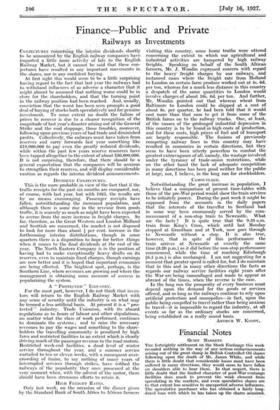HIGH FREIGHT RATES. •
Only last week, on the occasion of the dinner given by the Standard Bank of South Africa to African farmers visiting -this countrY, some home truths were uttered concerning the extent to which our agricaltural and indnstrial activities are hampered by high railway freights. Speaking on behalf of the South African farmers, Mr. J. Woodin expressed concern with regard to the heayy freight charges by our railways, and instanced cases where the- t'fteight rate from Holland to London on certain farm produce worked out at 4s. 6d. per ton, whereas for a much less distance in this country a despatch of the same quantities to London would involve charges of about 16s. 6d. per ton. And further, Mr. Woodin pointed out that whereas wheat from Baltimore to London could be shipped at a cost of about 8s. per quarter, he had been told that it would cost more than that sum to get it from some of the British farms on to the railway trucks. One, at least, of the causes of the prolonged industrial depression in this country is to be found in high costs of production, and for these costs, high prices of fuel and of transport are largely responsible. The fusions of previously competing railway lines in this country may have resulted in economies in certain directions; but they seem to have been utterly powerless to -combat the greatest extravagance of all, namely, the wastage involved under the tyranny of trade-union restrictions, while on the other hand the lack of adequate competition in many directions has been good neither for the public at large, nor, I believe, in the long run for stockholders.










































 Previous page
Previous page